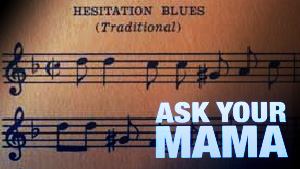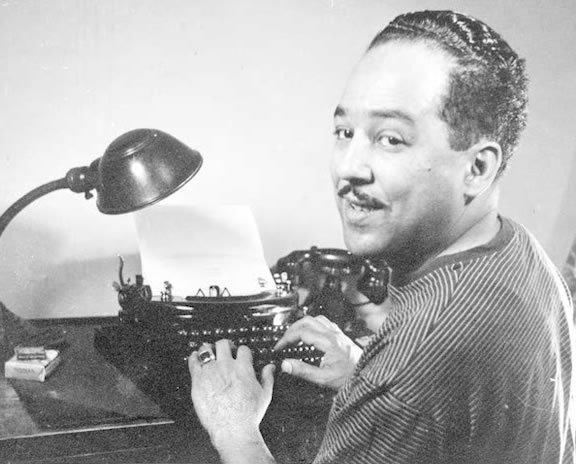I'm going to ask some students to comment here on their readings of Ask Your Mama.
This content is being reviewed in light of recent changes to federal guidance.
Ask Your Mama: Langston Hughes and Afrofuturism
My best friends and I used to be fond of playing the dozens—particularly, exchanging “yo’ mama” jokes. Too young to realize how problematic this was from a historical angle, we realized that this was probably something we should avoid only when the battles ended with a fist fight and/or punishment from someone’s angry mother- my best friends were also my first cousins. Needless to say, one of Langston Hughes’s works that I most appreciate is his book length poem, Ask Your Mama: 12 Moods for Jazz (AYM)(1961).
In this poetic rendition of “the dozens,” America is made to be the “mama” worthy of denigration. In the section “Horns of Plenty,” the poem reads, “ AND WHY DID RICHARD WRIGHT/ LIVE ALL THAT WHILE IN PARIS/ INSTEAD OF COMING HOME TO DECENT DIE/ IN HARLEM OR THE SOUTH SIDE OF CHICAGO/ OR THE WOMB OF MISSISSIPPI?/ AND ONE SHOULD LOVE ONE’S COUNTRY/ FOR ONE’S COUNTRY IS YOUR MAMA” (Ask Your Mama 500). By making America the “mama” in the dozens joke, Hughes used humor to identify the oppressive forces of both black and working class Americans like racism, capitalism, and cultural hegemony.

 The rhythms within the poem mimic jazz. For example, Hughes uses something called step rhythm, which in jazz refers to the repeated return to a dominant note. In the poem, Hughes often returns to a word set or sound before he completes a whole thought. Thus, Hughes’s poem manipulates sound and rhetorical structures in the same way that instruments and notes are manipulated in jazz to both recall sounds of West African music. Consequently, the foundations for something new and uniquely African American are formed. Additionally, the incorporation of music in poetry aids in demonstrating the relationship between poetry and time. Larry Scalon explains, “Music defines its formal elements precisely by their movement through time. . . Using music as a model enables Hughes to imagine the relation between poetry and politics as a specifically temporal one” (48).
The rhythms within the poem mimic jazz. For example, Hughes uses something called step rhythm, which in jazz refers to the repeated return to a dominant note. In the poem, Hughes often returns to a word set or sound before he completes a whole thought. Thus, Hughes’s poem manipulates sound and rhetorical structures in the same way that instruments and notes are manipulated in jazz to both recall sounds of West African music. Consequently, the foundations for something new and uniquely African American are formed. Additionally, the incorporation of music in poetry aids in demonstrating the relationship between poetry and time. Larry Scalon explains, “Music defines its formal elements precisely by their movement through time. . . Using music as a model enables Hughes to imagine the relation between poetry and politics as a specifically temporal one” (48).
In the section “Cultural Exchange,” Hughes lashes out at white politicians who perpetuate racism in the United States. In mid-poem, the song changes from “Hesitation Blues” to “Dixie”. The narrator then imagines a world of reversal in which black Americans have taken a position of power and white Americans are in a subordinate position. Black people are made wealthy and figures like Martin Luther King Jr. and Zelma Watson George assume high government positions. In contrast, the narrator reduces politicians like James Eastland, John Patterson and Orval Faubus—the senator responsible for ordering a military interference to prevent the Little Rock Nine from entering Central High School in 1957—to white mammies.

 As an experimental poem and a response to critics that deemed Hughes too simple, AYM is a demonstration of the ways in which Hughes was capable of manipulating language, music, and the poem as an art form for alternative purposes. In AYM, language and jazz and poetry itself become technological tools to subvert racial and class oppression. Thus, in the likeness of artists of Afrofuturism, Hughes uses jazz to evaluate the conditions in which black people of his time lived but to also revisit the past and envision a different future.
As an experimental poem and a response to critics that deemed Hughes too simple, AYM is a demonstration of the ways in which Hughes was capable of manipulating language, music, and the poem as an art form for alternative purposes. In AYM, language and jazz and poetry itself become technological tools to subvert racial and class oppression. Thus, in the likeness of artists of Afrofuturism, Hughes uses jazz to evaluate the conditions in which black people of his time lived but to also revisit the past and envision a different future.
6 Afrofuturistic Albums and Novels
Break It Down: Ask Your Mama–Excerpt from “Horn of Plenty”
3 thoughts on “Ask Your Mama: Langston Hughes and Afrofuturism”
-
-
Great analysis! The point of America as "your mama" was brought up in a question following Malcolm-Jamal Warner and Professor Ron McCurdy's excellent performance of the Hughes poem (on Hughes' 108th birthday) at the University of Southern California last night and McCurdy, who has devoted a full decade at musicalizing Hughes' words seemed both pleased and surprised at the thought. And here it was, sitting in your essay, all this time.
-
Oops…make that L.H.'s 112th birthday. My bad.
Comments are closed.